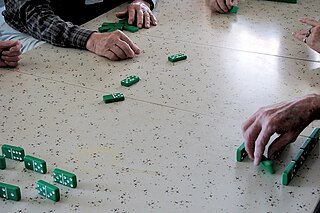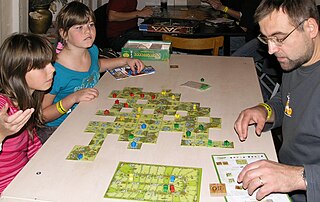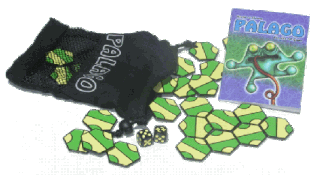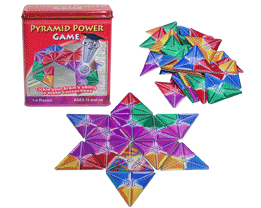Gameplay
The goal of the game is to play all of the tiles in your hand and score the most points. Players start by choosing one player to keep score. The 36 tiles are placed face down and shuffled, then each player draw a hand of tiles based on the number of players (7 tiles for 2 players, 6 for 3 players, and 5 for 4 players). The tiles are then flipped face up. Players must keep the tiles in their hand face up, but are allowed to stack their tiles so other players can only see the top-most tile. Players can look at the tiles in their hand at any time. The remaining undrawn pyramids are placed aside. One pyramid is drawn from these tiles and placed face-up in the middle of the play area as a start tile. Players choose a start player and that player chooses one pyramid from his stack and places it in play adjacent to another pyramid do that the adjacent side colors match. Doing so earns the player the number of points shown on the pyramid placed. Players may not "straddle" two pyramids by placing a tile so that one side is adjacent to two pyramids, but can place a tile so that two or more sides are adjacent to two or more aides of other pyramids as long as the colors of the adjacent sides all match. Doing so scores the player the points for the pyramid placed and all adjacent pyramids.
If a player is unable to play any pyramid in their hand, they must draw one from the face down supply and turn it face up. They then check to see if it can be played immediately anywhere on the board. If it can be played, it must be played. If it cannot be played, the tile is placed face up next to the players hand and can be played on a later turn instead of playing a tile from that players hand. Additionally, there is a wild pyramid that can be played and match any color on all sides, but is worth zero points. If a player has the wild pyramid in hand and cannot play any other pyramid, they must play the wild.
The game ends when one player plays the last pyramid in their hand. That play scores a bonus equal to the point values of all remaining tiles in his opponents' hands. If the face down supply runs out before any player's hand does, the player with the fewest remaining tiles in hand scores 25 points (but does not score for tiles in opponents' hands. If there is a tie for fewest, the player with the lowest score gets the bonus.

Mahjong or mah-jongg is a tile-based game that was developed in the 19th century in China and has spread throughout the world since the early 20th century. It is played by four players. The game and its regional variants are widely played throughout East and Southeast Asia and have also become popular in Western countries. The game has also been adapted into a widespread online entertainment. Similar to the Western card game rummy, mahjong is a game of skill, strategy, and luck. To distinguish it from mahjong solitaire, it is sometimes referred to as mahjong rummy.

Triominoes is a variant of dominoes using triangular tiles published in 1965. A popular version of this game is marketed as Tri-Ominos by the Pressman Toy Corp.

42, also known as Texas 42, is a trick-taking game played with a standard set of double six dominoes. 42 is often referred to as the "state game of Texas". Tournaments are held in many towns, and the State Championship tournament is held annually in Hallettsville, Texas on the first Saturday of March each year. In 2011 it was designated the official State Domino Game of Texas.

Alhambra is a 2003 tile-based German-style board game designed by Dirk Henn. It was originally published in Germany by Queen Games in a language-interdependent version; an English-specific version was released in North America by the now-defunct Überplay. The game is a Muslim-themed update, set during the construction of the Alhambra palace in 14th century Granada, of the 1998 stock trading board game Stimmt So!, which in turn was an update of the 1992 mafia influence board game Al Capone; the original version was subsequently released as Alhambra: The Card Game. Upon its release, Alhambra won numerous awards, including the Spiel des Jahres award. Its success has led to the release of numerous expansion packs and spin-off games, and is becoming Queen Games' flagship franchise.

Rummikub is a tile-based game for 2 to 4 players, combining elements of the card game rummy and mahjong. There are 106 tiles in the game, including 104 numbered tiles and two jokers. Players have 14 or 16 tiles initially and take turns putting down tiles from their racks into sets of at least three, drawing a tile if they cannot play. In the Sabra version, the first player to use all their tiles scores a positive score based on the total of the other players' hands, while the losers get negative scores. Variations of the game contain four jokers. An important feature of the game is that players can move and reuse the tiles that have already been placed on the table.
Scrabble variants are games created by changing the normal Scrabble rules or equipment.

Ingenious is the English name for Einfach Genial, a German abstract strategy board game designed by Reiner Knizia under commission from Sophisticated Games and published in 2004 by Kosmos. Across most of Europe it is titled as the local translation of Ingenious or Simply Ingenious, the notable exception being Mensa Connections in the UK.

Carcassonne: Hunters and Gatherers is a German-style board game. It is a member of the Carcassonne family of board games, and was developed by Klaus-Jürgen Wrede. It was first published in 2002, in German by Hans im Glück, and in English by Rio Grande Games. In 2015, the English Second Edition was published by Z-Man Games.
Carcassonne: The City is a German board game for two to four players. As a member of the Carcassonne family of games, it is created by Klaus-Jürgen Wrede and distributed by Hans im Glück in German and Rio Grande Games in English. Like other Carcassonne games, the objective of the game is to score points based on placement of the tiles. However, The City also adds city walls and towers, which can inhibit the growth of the playing field in a certain direction. The City is packaged in a "deluxe" manner: the box itself is made from wood, as are the parts for the city walls, followers, and towers.

Okey is a tile-based game. The aim of the game is to score points against the opposing players by collecting certain groups of tiles. Okey is usually played with four players, but can also be played with only two or three players. It bears resemblance to the game Rummikub, as it is played with the same set of boards and tiles, but under a different set of rules.

Mexican Train is a game played with dominoes. The object of the game is for a player to play all the tiles from his or her hand onto one or more chains, or trains, emanating from a central hub or "station". The game's most popular name comes from a special optional train that belongs to all players. However, the game can be played without the Mexican train; such variants are generally called "private trains" or "domino trains". It is related to the game Chicken Foot.

Qwirkle is a tile-based game for two to four players, designed by Susan McKinley Ross and published by MindWare. Qwirkle shares some characteristics with the games Rummikub and Scrabble. It is distributed in Canada by game and puzzle company Outset Media. Qwirkle is considered by MindWare to be its most awarded game of all time. In 2011, Qwirkle won the Spiel des Jahres. A sequel, Qwirkle Cubes, was released by Mindware in 2009.
Oceania is a board game by Klaus Teuber, published by Mayfair Games. It is a simpler version of Entdecker, and is played with one or two players. The solitaire version's objective is completely different from the two player version's.

Palago is a creative art puzzle/game designed by Cameron Browne. A Palago set contains 48 identical regular hexagonal tiles which can be used for a series of puzzles, a strategic two-player game and a co-operative multi-player game called Palagonia which was co-designed with Mike McManaway, the inventor of Tantrix.

Three-player mahjong is a variation of mahjong for three players rather than the more common four-player variations. It is not a mere adaption of four-player mahjong to suit only three players but has its own rules and idiosyncrasies that place it apart from the more standard variations. The equipment used and the basic mechanisms are much like four-player variations though some tiles are removed, certain plays are prohibited and the scoring system is simplified. The game is embraced in some Asian countries while ignored or snubbed in others.
The Genius: Rules of the Game is the first season of The Genius debuted on tvN on April 26, 2013.
The Genius: Rule Breaker is the second season of The Genius, which debuted on tvN on December 7, 2013.
Le Trioker is an corner-matching puzzle game played using 25 equilateral triangle-shaped tiles. Each corner is marked with zero, one, two, or three dots and newly placed pieces must match the values on pieces already placed on the game board, similar to the gameplay of the earlier Triominoes.

Contack is a dominoes-like game for one to seven players which was patented by Parker Brothers and published in 1939. It uses 36 equilateral triangle tiles; each side is assigned a different color and numerical value. Players take turns laying tiles from a hand of five next to tiles already on the table; newly-laid tiles must match the color of adjacent tile(s).












